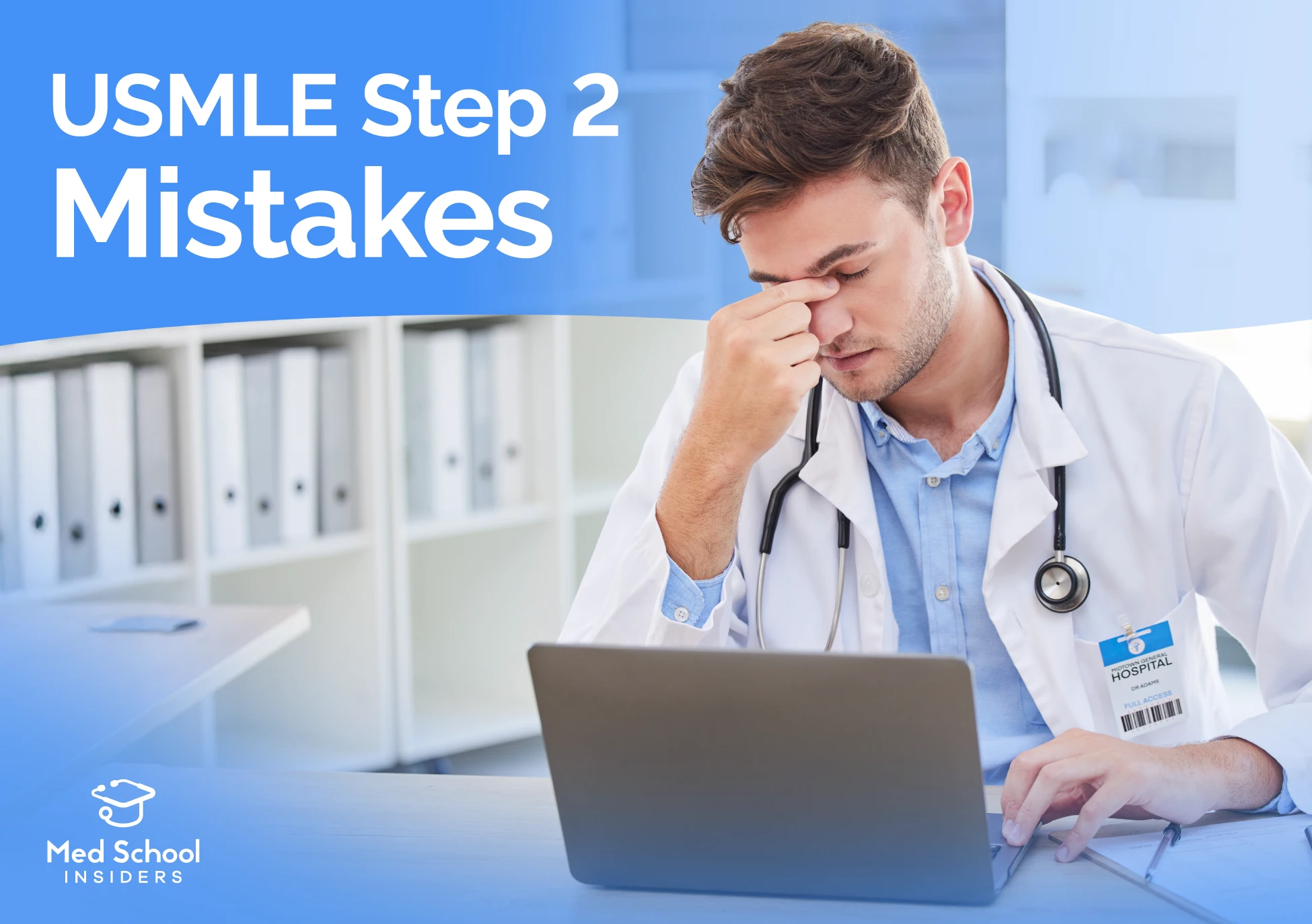
11 Careers That Can Transition Into Becoming a Doctor
Medical schools increasingly value career changers. Here are 11 careers that translate well into medicine, and what makes them strong foundations.

Step 2 CK isn’t just another shelf test—it’s often the only numerical score residency programs have to assess your readiness from a purely academic perspective. With Step 1 pass/fail, a fail or low score can derail specialty goals, reduce interview invites, and push you into less competitive options.
Step 2 CK scores reflect both your study approach and your test day strategies. The following article will break down common mistakes in both of these and how you can avoid them.
Even strong students can sabotage their Step 2 prep by falling into avoidable traps. Below are the most common mistakes and how to prevent them.
One of the biggest pitfalls is chasing every new book, deck, or podcast in hopes of uncovering “hidden” Step 2 content. This creates the illusion of productivity but dilutes focus. Step 2 rewards depth, not breadth—the ability to apply illness scripts and management algorithms under pressure.
Students often fall into this trap because of anxiety. They worry that one missed resource could cost points. In reality, UWorld is the gold standard, and AMBOSS/Anki serve as structured reinforcement.
Trying to master everything spreads attention too thin, leaving core resources underutilized.
How to avoid it: Make UWorld the foundation. Complete it fully, review carefully, and redo missed questions. Use AMBOSS strategically for breadth and Anki for retention—but never at the expense of mastering UWorld.
Many students respond to missed questions by transcribing entire explanations, filling pages with notes they never revisit. This feels productive in the moment, but fails to address the real issue: learning the precise fact or pattern that was missed.
Students fall for this because writing extensively feels like “doing work.” But unless notes are distilled into concise, memorable takeaways, they are inefficient and overwhelming.
Step 2 rewards recall and application, not paragraphs of half-digested explanations.
How to avoid it: Reduce every error to a one-line learning point—specific, testable, and actionable. For example: “Cocaine chest pain → treat with benzodiazepines, avoid beta-blockers.” Keep a running document or error log. Once mastered, check it off. This keeps the review lean and high-yield.
One of the fastest ways to plateau is missing the same question type multiple times. This signals that a concept is not being properly corrected or reinforced. High scorers turn every error into a permanent strength, while others simply move on and hope not to see it again.
Students often fall into this trap due to time pressure. It feels easier to keep progressing through question blocks than to pause, dissect, and correct every error. But this shortcut is costly—Step 2 recycles the same patterns again and again, and uncorrected mistakes will resurface.
How to avoid it: Maintain an error log or illness script bank. After each block, reframe missed questions: “How would the vignette need to change for this wrong answer to be correct?” This transforms one miss into multiple new learning opportunities. Review this log daily and cross items out only once they’re mastered.
Even with perfect prep, poor execution on test day can sink performance. Fatigue, poorly timed breaks, or untested routines can lead to lapses in focus and prevent knowledge from translating into points. Step 2 is not only a knowledge test—it’s an endurance event.
Students often neglect this step because it feels less important than studying. But your test-day strategy is the bridge that allows preparation to show up when it counts. Without it, even well-prepared students will underperform.
How to avoid it: Treat test day like game day. Plan meals, snacks, and caffeine ahead of time—don’t try anything new. Schedule breaks in advance (e.g., short walk every two blocks) and rehearse the routine during practice exams. Use short resets between blocks to clear mental clutter. Execution is a skill, and practicing it ensures peak performance when it matters most.
Ask anyone who just took Step 2 what they regret most, and you’ll hear the same thing: “I made so many silly mistakes.”
The truth? Silly mistakes aren’t random. They’re usually the result of poor pacing, lack of focus, or failing to build test-day stamina.
You need to train yourself not just to know the content, but to execute under pressure. A well-crafted game plan is essential for translating all the long hours of studying into effective test-day performance. Remember, you can study for as long or as much as you want, but, for better or worse, only your score on test day will stay with you.
How to avoid it: Slow down just enough to catch details. Highlight key modifiers in the vignette (“first step,” “most appropriate,” “next best test”). Practice self-awareness—if you feel yourself rushing, take a deep breath to reset. And during review, don’t just say “ugh, dumb mistake.” Ask: “What habit led to this? How do I prevent it next time?”
More than simply avoiding mistakes, you need an ironclad strategy for Step 2 CK success. That’s why we’ve developed comprehensive resources to help you achieve a 270+ score and stand out in an increasingly competitive landscape.
It provides insider strategies and proven methods that go beyond basic test prep to give you the competitive edge you need to secure your target specialty.
Failing Step 2 has consequences that extend far beyond just retaking the exam. A failing score forces you to delay applications and explain the failure to every program you apply to.
However, what’s potentially even worse is scoring poorly on the exam and not being able to retake it. You’re stuck with that number on your application—permanently.
The undeniable truth about Step 2 CK is that it’s now the primary standardized test score residency programs use to evaluate candidates, and the bar keeps rising. Each year, we’re seeing higher average scores increase across specialties.
Many competitive specialties already have average scores between 266 and 268, and remember—this is the average, meaning many sought after applicants score even higher.
When the NRMP releases new data, we expect to see score averages increase for all specialties, regardless of competitiveness level. You can track the latest specialty-specific score data at specialtyranking.com.

Medical schools increasingly value career changers. Here are 11 careers that translate well into medicine, and what makes them strong foundations.

USMLE Step 3 pass rates are 96–97% for first-time U.S. MD and DO graduates. Learn what happens if you fail, retake policies, and how much the score matters.